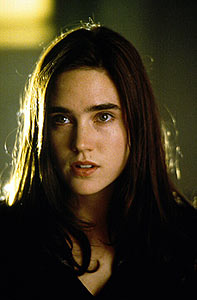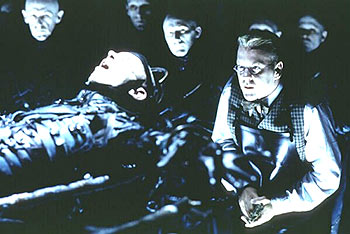Dark City Is Overrated
Published on January 30th, 2009 in: Issues, Movies, Over the Gadfly's Nest |By Chelsea Spear
In 1998, Alex Proyas’s Dark City saw a quiet theatrical release, and an even quieter end to its engagement. In the years since it was dismissed and disinterred to home video, filmmaker Joss Whedon and Roger Ebert, dean of American film critics, have found inspiration in the expressionistic, dystopian feature. Andy Herod of acclaimed indie band The Comas cited the film as “the only movie that makes sense or matters.” It has become a fetish object for slavering fanboys and Ebert acolytes. A decade later, it has all but been inducted into the neo-noir cannon. Ebert has recorded a commentary track for the deluxe edition DVD. Fans discuss the news of a sequel in hushed, reverent tones.
It is quite possibly the most overrated film of the 1990s.

Jennifer Connelly as Emma Murdoch
For those of you who missed out, the story goes like this: Amnesiac John Murdoch (Rufus Sewell) has been accused of murdering several prostitutes in rather perverse ways. While doing his own search for the one who really committed these murders, a mad scientist with a speech impediment (Kiefer Sutherland) tips him off to a sinister underground ring known as The Strangers who alter the city and its inhabitants nocturnally. In his role as the wronged suspect, Murdoch must find a way to stop them before they destroy him.
If you think you’ve seen this movie before. . . you have. Proyas seems to have written the script by taking the plot of all German Expressionist features and film noirs, throwing them in a blender, and hitting “puree,” all the while adding very little of his own to the mix. There’s enough plot in here for five movies, and the exchanges between the characters contain very little of anything that could be classified as “dialogue.” Chicago Reader critic Lisa Alspector observed that Dark City “is so boring [because] the characters have to keep explaining the plot to one another.”
The extensive use of expository dialogue might be excusable if the performances were of high quality and stylistically consistent with one another. However, the actors hit one of two notes: monotonous line-readings, and overenthusiastic scenery chewing. Much of the cast falls into the former camp. Granted, the performances in many of the films that inspired Proyas were not known for their expressive qualities, but most of the actors here seem to be thinking of something else, anything other than the drama unfolding onscreen—the craft service table, for example, or whether they will get a town car or a limo to the shoot tomorrow. The elaborate ways in which the actors are staged suggest that a production assistant is standing out of shot, holding cue cards with the lines printed on them.

Kiefer Sutherland as Dr. Daniel P. Schreber
Holding up the scenery-chewing end of the spectrum with great aplomb is Kiefer Sutherland, in the second indie film in which he tried to challenge his image as a sarcastic action star and aging teen idol (the similarly drecky Freeway was the first). Sutherland, who replaced Sir Ben Kingsley in the role (perhaps Kingsley read the script?), is a good thirty years too young and far too callow to play the diseased, weather-beaten voice of reason. What he lacks in age and depth, however, he makes up for with great enthusiasm. His attempts at an Eastern European accent of questionable origin sound like a stutter, while his performance as a crippled man with almost-supernatural powers of intellect is mired with a sense of gung-ho enthusiasm. Yes, this is the Peter Lorre role, and Sutherland plays it as homage to him. As only a drunk frat boy could.
Pages: 1 2
Time limit is exhausted. Please reload the CAPTCHA.